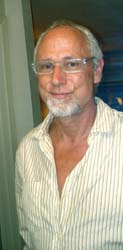(Scott Lines, Ph.D. is a Bay Area psychologist-psychoanalyst, writer and musician living in Berkeley. He can be reached at scottalines@comcast.net.)
It was in early November 2007, midway through a fitful night’s sleep on a spongy mattress at the Knight’s Inn in Richmond, Indiana, fourteen miles from Jim Jones’ birthplace, that the idea of an opera based on the Jonestown epic first presented itself.
I had come back to my hometown – Jones’ temporary home in the late 1940s – on my second of several trips to Indiana researching Jones’ family history, conducting interviews with family members and neighbors who knew Jim Jones in his formative years, for the psychobiography of Jim Jones that I had begun some months earlier (story here). Walking past the old Indiana Theater at 10th and Main, situated just a few blocks from where Jim Jones and his mother, Lynetta Jones, resided in Richmond, the thought occurred to me, “This story, the whole of it, from his meager childhood through the hubris of Peoples Temple to the tragic end at Jonestown, feels constrained between the covers of a book. It needs a larger canvas, a stage, a screen, something . . .”
Actually, that was the second time I’d had that thought. The very first inklings of a Jonestown something – something other than the book I’d been working on for six months – had come to me a few months earlier, on a freezing August evening in Berkeley. As some may know, Berkeley is frequently beset with same weather that makes summer in San Francisco the coldest winter in Mark Twain’s memory. I had installed myself on the backyard patio, writing in the dim shadow of my Wi-Fi signal, which allowed me to be Internet-connected and to work as I indulged my one-cigarette-a-day habit. But I owed the dim shadow not only to my weak Wi-Fi signal, nor to the chill of the hour, but also to the cloud of ominous feelings that had gripped me as I worked with the “death tape,” listening to the last words of over 900 people who would die that night, the last night of Jonestown’s earthly existence.
Each night for a week, I listened to the plaintive whimper of the children of Jonestown as Jones harangued his beleaguered congregation from his chair in the pavilion. Parents, exhausted from countless “white nights” suicide drills, extinguished their children’s lives, and followed this by taking their own. Between these faint yet terrified cries spoke the resolute voice of Christine Miller, the one Temple member who argued publicly against mass murder that night. That’s when the idea of a Jonestown project – other than a book – first germinated in my mind. As their voices stirred me, Jones’ voice sickened me in equal measure. I was pulled into the drama unfolding on the tape, listening to voices on my dark patio that I knew would soon enough be snuffed out by the certitude of their delusional leader, no matter how many times I started and stopped the tape. I saw that these voices needed to be heard, not as text alone, but in a medium that conveyed the exultation and anguish that was Jonestown.
Opera is the one art form, as an opera singer friend of mine reminded me recently, which demands everything from its creators, cast and its audience, simply by requiring that they endure the length, breadth and emotional involvement of its expression. Engaging in opera as composer, librettist or audience requires commitment to a story or a text, unparalleled by other forms of artistic expression. Like Greek tragedy, Shakespeare and some forms of dramatic theater and film, opera at once portrays and confronts hubris in the human condition. That the Rev. Jim Jones engaged in a level of hubris worthy of Sophocles’ Oedipus is obvious by the final act at Jonestown. As he said, “If you want a God, I’ll be your God!” That statement alone guarantees Jones admission into the pantheon of the hubristic, where he can keep the company of the other deluded demagogues well-known to history.
The corpus of books, plays, films, and, yes, websites that continue to parse the known facts, half-truths and speculations regarding Jonestown attest to its capacity to enter our dreams and disturb our sleep. The Jonestown story encompasses the largest mass murder outside of 9/11 in America’s history, including the only killing of an American congressman in the line of duty. There have been several books, most notably Tim Reiterman’s epic chronicle, Raven; films, most notably, of course, Stanley Nelson’s riveting Jonestown: The Life and Death of Peoples Temple; and plays, including Leigh Fondakowski’s The People’s Temple. But never an opera. I feel its time has come.
Act One: Jones’ childhood in Lynn, Indiana, characterized by abject neglect by his disabled, depressed, withdrawn WWI veteran father and confusing idealization by his irascible mother; his burgeoning interest in Pentecostalism and preaching as a way to get notice and command respect from others; elements of bizarre behavior.
Act Two: The beginnings of Peoples Temple in Indianapolis; Jones’ preaching successes, his sexuality, and political involvement; San Francisco; controversy and exodus.
Act Three: Life in Jonestown proper; the White Nights threats; the visit of Rep. Leo Ryan and his entourage; the killings at the Port Kaituma airstrip; the last night at Jonestown.
As a large form, opera demand collaborators. This project is in the initial stages of conceptualization and libretto development. Some musical elements have been loosely developed and recorded. I am seeking collaborators on this project, specifically in terms of musical composition, film/video components and audio components. I am actively seeking development support from foundations and arts support organizations, and any ideas about this aspect of the project are especially welcomed. If anything about this project lights a fire within you, I would be happy to hear from you. I can be reached at scottalines@comcast.net.
Power to the peaceful.
